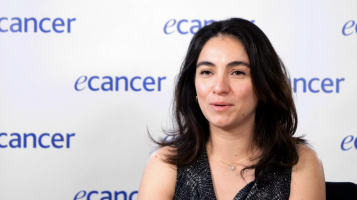I would like to highlight the efforts by many colleagues, including the authors of an important abstract at ASCO 2021 from the ASCO Registry. Dr Mileham and colleagues presented data looking at the evaluation of predictive prognostic factors and I had the chance to be the discussed in this session. They found interesting findings from the ASCO Registry that focussed on a lot of community centres and patients who had an active cancer. They showed results that actually corroborated, to a degree, the results from the COVID-19 and Cancer Consortium validating some of the prognostic factors, for example older age. The question remains if there is any particular cut-off that really makes a difference in terms of prognostication, in terms of outcomes of patients with COVID-19 and cancer.
They also showed an interesting fact that was also shown by Dr Guarneri and colleagues from Veneto, Italy, that showed that over time in the pandemic the mortality decreased, was lowered over time, went down. We tried to figure out why this happened, why we had improvement in disease severity, COVID-19 disease severity, and mortality. It’s a reflection of the improvements in the field but we tried to figure out how we can learn from these trends and how we can capitalise on that and improve the outcomes of patients with COVID-19 and cancer. We had some discussion that I did at ASCO 2021 and I invite the audience to look at this discussion to reflect with me about the different implications.
The other important poster that was discussed by me was the work by Dr Subbiah and colleagues at the MD Anderson Cancer Center that they looked at real world data of patients with cancer in a non-trial design that was [?? 1:55] so this was not a clinical trial. But they looked at how patients with cancer did after vaccination with one of the mRNA vaccines against COVID-19. Overall they saw that in this real world setting with a high number of patients the vaccine, this particular mRNA vaccine, was safe and effective in patients with cancer which was a very important finding because a representation of patients with cancer in the COVID-19 vaccine trials was very small – less than 3% of patients with cancer were part of those trials that led to the authorisation of this vaccine. So it was important data to show that in patients with cancer this particular mRNA vaccine was safe and effective and I would definitely encourage other institutions to look at their own data, report this real world evidence. Of course, with longer follow-up they may have data updates and also look at other vaccines. Of course I would like to see longer follow-up data, any potential break-through infections. But overall this data substantiates and reinforces the high priority to vaccinate patients with cancer as soon as possible because we know from the data from the COVID-19 and Cancer Consortium with my colleagues and other datasets that patients with cancer have worse outcomes when they get infected with SARS-CoV-2 virus. So it’s important to prioritise those patients for vaccination in healthcare policies.
So, overall, I would like to congratulate my colleagues who have these important posters and invite the audience to review them. Hopefully we will have more successes in the battle against COVID-19 with more lives saved and more prevention and I also look forward to seeing everybody in person when this is safe, likely in 2022 ASCO. Thank you so much for your attention.








